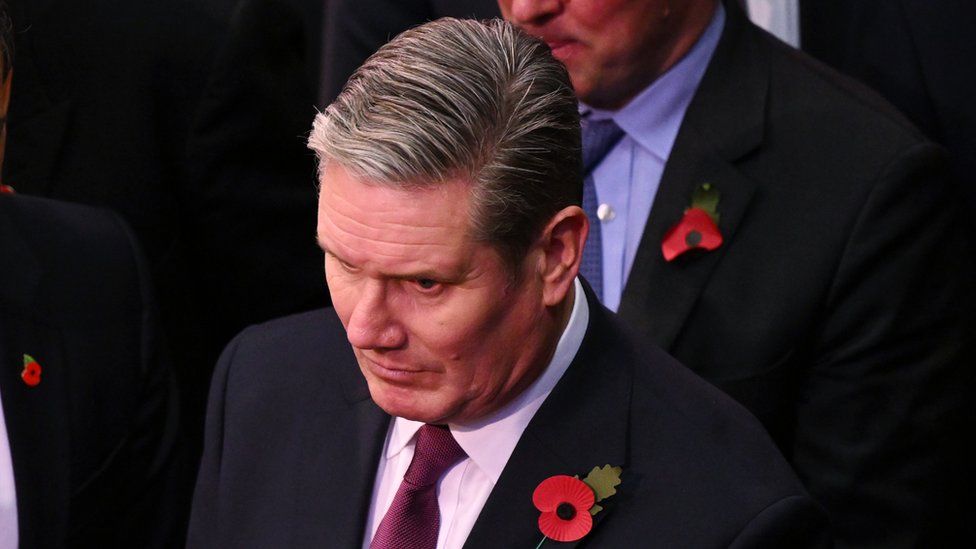ARTICLE AD BOX
 Image source, Getty Images
Image source, Getty Images
Keir Starmer has so far resisted calls within his party to advocate a ceasefire in the Israel-Hamas war
By Chris Mason
Political editor, BBC News
Imran Hussain is not a widely known name beyond Bradford or Labour politics.
But his resignation from Sir Keir Starmer's frontbench team matters, because of where the logic of his leap will leave others on the frontbench we know are sympathetic to his view.
We are keeping track of views of those in the Labour Party on the war in the Middle East, to have a handle on the scale of the dissent from Sir Keir's position.
Our latest count suggests 66 Labour MPs have publicly expressed views that are, or could be perceived to be, at odds with the party leadership.
That is a third of Labour MPs. And 17 frontbenchers have put out statements, written or shared posts on social media doing the same.
Forty-seven councillors have resigned. To put that in context, there are around 6,500 Labour councillors in Britain.
So, the question now is, what do other frontbenchers do?
How will his constituency neighbour, Naz Shah in Bradford West, react? She has called for a ceasefire and said "we cannot be silent".
I'm told Mr Hussain informed the party whips - who are in charge of discipline - of his intention to resign on Tuesday night, before announcing it publicly at gone 11pm.
The party leadership, a source tells me, has "no specific intelligence" anyone else is about to follow suit.
It has been pointed out to me that Mr Hussain was the only frontbencher to have signed a fresh parliamentary motion calling for a ceasefire, which was tabled on Tuesday.
A curious parliamentary technicality - the State Opening of Parliament this week - has meant a previous motion advocating a ceasefire disappeared and had to be re-tabled.
I understand it was made clear this time to frontbenchers that signing the latest motion wouldn't be compatible with them staying in their posts.
Parliament vote looms
The next parliamentary flashpoint will come if, probably when, Parliament gets to vote on a ceasefire position.
I'm told Labour MP Zarah Sultana has tabled an amendment to the King's Speech calling for this. The Scottish National Party, which wants a ceasefire, is also likely to push for a vote too.
Image source, House of Commons
Image caption,Imran Hussain has been the MP for Bradford East since 2015
Labour frontbenchers of a different view to Sir Keir Starmer would find themselves in a very awkward position.
They would find themselves in a bind: caught between an instinctive desire to be loyal to Sir Keir, desperate to see a Labour election victory and supportive of the leadership in securing one.
But, also, loyal to their conscience, and, in many cases, their constituents, who are demanding they advocate a ceasefire.
By our calculations, of those 17 frontbenchers with a publicly expressed view at odds with the Labour leader, 11 represent seats where more than 30% of the electorate say they are Muslim.
Where, in other words, a propensity to express sympathy with the Palestinians, and deep anger at what is happening, is likely to be higher than in many other places.
Starmer criticism
Given Starmer's position - which isn't going to change - there was always going to be dissent within the Labour movement.
But figures across the party have told me privately they think Sir Keir's handling of it has made it considerably worse.
"It is ridiculous how he's managed to make this into a Labour Party drama," said one.
Another said what they saw as a perceived lack of nimbleness had made things worse.
A radio interview he gave in mid-October, in which he appeared to endorse Gaza having its power and water turned off, infuriated many.
As did the more than a week it took him to row back from those remarks and seek to "clarify" what he meant.
And some think he should have given more strategic thought at the outset to how the conflict in the Middle East was likely to play out, and how he should reflect that.
He is now seeking to placate those with a differing view.
A Labour Party spokesman said the party "fully understands calls for a ceasefire".
But, he added, "a ceasefire now will only freeze this conflict and would leave hostages in Gaza and Hamas with the infrastructure and capability to carry out the sort of attack we saw on 7 October".
Of course, all of this is utterly trivial in the context of the war itself. The view of the British opposition would make no immediate difference.
But it does matter to Sir Keir Starmer's leadership - and the coherence, or otherwise - of the party he is putting forward as the next government of the UK.

 1 year ago
21
1 year ago
21








 English (US) ·
English (US) ·